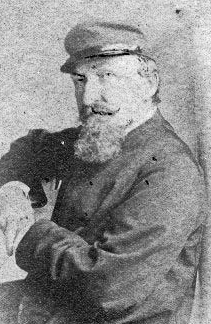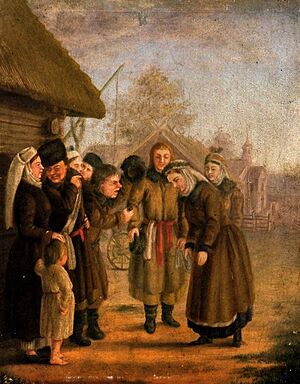Lucjan Kraszewski facts for kids
Lucjan Kraszewski was a talented Polish artist and photographer. He was born on July 24, 1820, in Pruzhany and passed away on February 2, 1892, in Honiatycze. He is remembered not only for his art but also for taking part in an important historical event called the January Uprising.
Contents
Early Life and Education
Lucjan Kraszewski came from an important family. His father, Jan Kraszewski, was a major landowner. His mother was Sofia Malskaya. Lucjan had two brothers, Józef and Kajetan, who both became famous writers.
Lucjan first went to a monastery school near Pruzhany. Then he attended a gymnasium, which is like a high school, in Svislach. Later, he studied natural sciences at the University of Dorpat. After finishing his studies, he returned to his family's home and married Stefania Sulkouskaya.
Developing His Artistic Skills
While at the university, Lucjan became very interested in drawing and painting. In 1857, he went on a trip to visit art galleries in Belgium, Holland, and Germany. During this trip, he also discovered a passion for photography.
Life After the Uprising
Lucjan Kraszewski took part in the January Uprising. This was a big rebellion in Poland against Russian rule. Because of his involvement, he was sent away from his home to a place called Kungur in Russia. His family's property was also taken away.
Three years later, he was moved again, under police watch, to Tsivilsk. There, he started a small photography studio. Many of his photographs from this time still exist today. They are very important because they show what life was like in Chuvashia in the 1800s.
In 1868, Lucjan was allowed to return to Poland. He sold his remaining share of the family property to his brother Kajetan. He then moved to his wife Stefania's family home near Honiatycze. He spent his time between this estate and the city of Warsaw. Lucjan Kraszewski passed away at the estate and was buried in Wisznice.
Artistic Legacy
Lucjan Kraszewski created many drawings, watercolors, and graphic artworks. He also illustrated the books written by his brother, Józef. Most of his art shows everyday scenes from life in Poland, Lithuania, and what is now Belarus. He especially loved to paint in the area around Grodno.
He was one of the first photographers in that region. His artworks can be found in important collections, like the National Museum, Warsaw, and the National Academy of Sciences of Ukraine. Sadly, none of his works are currently in Belarus.



